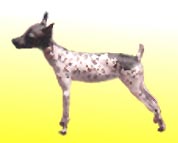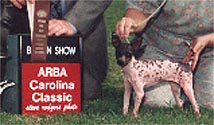AMERICAN HAIRLESS
TERRIER
All the information on this breed has
been provided by the National American Hairless Terrier Alliance.
We are including it because the history says the American Hairless was
created from the Rat Terrier.
HISTORY OF THE AMERICAN
HAIRLESS TERRIER
| In
the fall of 1972, Edwin and Willie Scott were given a small puppy that
was born into a litter of Rat Terriers owned by some friends of theirs.
All the puppies looked normal except for this one very odd looking pup.
She was normal in everyway, but lacked one thing the others had.....hair!
Little did the Scott's realize....the day that strange little pup came
into their home would set them on a course of developing a new and very
unique breed.....the American Hairless Terrier.
The new puppy's
name became Josephine and she quickly melted the hearts of everyone in
the Scott's family. Josey turned out to be the "perfect" pet as she was
highly intelligent, active, loyal, and best of all she was clean. With
the lack of hair, there were no fleas, therefore.....no need for smelly
flea products, and no dog hairs all over the furniture and floors. With
summer, though, came the hot Louisiana
sun and they learned that Josephine's
soft and delicate skin would need protection against the harmful rays.
A thin layer of good suntan lotion proved to effectively protect their
new little pup's skin on those sunny summer days. |
Breeders of the
American Hairless Terrier
Willie and Edwin Scott
with Trout Creek's
Sparky
|
.
Josey proved
to be a loving and loyal family member, an avid traveler, and a lover of
everyone she met. She absolutely loved people and drew alot of attention
everywhere they went. The Scott's found Josephine to be such a special
dog and excellent pet that they decided to attempt breeding her in
hopes of getting more "hairless" pups. The fact that they had never
bred dogs before was not going to stop them from this endeavor. This
was a loving, playful and clean dog....."the perfect house pet".....they
wanted others to have the opportunity to be owned bysuch a wonderful dog.
They talked about
their plans to many people, including several scientists, but they got
the same answer everywhere they went. "It just can't be done." or "You're
just wasting your time." seemed to be the repeating reply they would receive.
"She's a freak of nature and will never reproduce the same....the hairless
trait." But statements like this did not stop the Scott's. They decided
to go ahead with their plans and bred her.
At the age of
one year, they bred Josey to a Rat Terrier. She produced a litter of four
puppies and amazing enough, one of the pups was a hairless female which
they named Gypsy. Unfortunately, Gypsy was too small to breed so they kept
their hopes on Josephine. Over the years Josey gave the Scott's several
litters, but not the hairless pups they were so hoping for....their hopes
were beginning to fade.
Then just as they
were ready to give up, they decided to give it one more try. So at the
age of nine years, Josephine was bred her final time. And on December 30,
1981, a miracle happened.....Josephine became the proud mother of four
beautiful puppies. It would be a very happy new year, indeed.
The litter produced
a hairless male they named Snoopy, a hairless female they named Jemima
and two female coated pups named Queenie and Petunia. This became the foundation
of the Scott's dream and brought their hopes back to reality. This was
a new beginning for their family. They bred Snoopy to all of his littermates
once they reached a year old. Jemima produced an all hairless litter and
to the Scott's surprise, Petunia and Queenie produced litters of hairless
and coated. Their house was becoming filled with these loving bundles of
joy and the Scott's found they needed to make that decision to build a
kennel for their four-legged critters. So a kennel was built adjoining
their house and was aptly dubbed the name of "Trout Creek Kennel".....home
of the American Hairless Terrier. So you see folks.....dreams do come true
and miracles do happen!
.
This unlikely
Louisiana couple had a dream and through all the negativism and insurmountable
odds, they persevered until that dream became a reality. This story may
serve as a testimony to the strength a person can attain when following
their hearts. The struggle a person can withstand when they know in their
hearts they are doing what they have been strongly led to do. I am
so thankful to the Scotts for pushing through those odds and making the
American Hairless Terrier a reality that we all can love and share.
STANDARDS
FOR TOY AMERICAN HAIRLESS TERRIERS
.
Accepted October 10, 1998
GENERAL APPEARANCE:
The dog's body
is neat and trim, resembling a very small deer. The dog's carriage and
confident manner should give the appearance of vigor and self-importance.
A very small lively active and alert companion dog, not a heavy muscled
working dog.
HEIGHT: From withers
to ground the measurement should be 8 to 12 inches.
WEIGHT: Weight in proportion
to height should range from 6 to 10 pounds.
HEAD: A rounded skull,
cheeks and jaws are lean. A well-defined stop is formed where the
muzzle joins the skull. The muzzle is thinner than the head, tapering to
the nose. The length of the muzzle from the tip of the nose to the stop
is approximately one half the length of the head from the tip of the nose
to the occiput.
EARS: Moderate size, naturally
erect or tipped.
TEETH: Full dentition with
level or scissors bite. Slightly over or under will be allowed due
to the small gene pool at this time. *Once the gene pool has sufficiently
increased the slightly over or under will no longer be allowed. Missing
teeth a fault.
EYES: Round, full, slightly
bulging with an alert expression. Eyes may be any color.
NOSE: Self-colored
NECK: Medium length with
a graceful arch
BODY: A moderately muscled
body that is slightly longer than height. Rump curves slightly to
tail set. Long straight forelegs with toes turning neither in or out and
moderately angulated hindlegs with hocks neither turning in or out.
TAIL: Moderately long
and carried up or back.
FEET: A dainty foot with
small slender toes and medium length nails. Well split but not spread.
Splayed feet a fault. Dewclaws may be left or removed.
SKIN: Warm to the touch,
soft and smooth. Skin may be covered with a very very fine, almost
undetectable layer of minute hair. This does not resemble normal hair and
normal hair on any part of the body other than whiskers or eyebrows is
considered a disqualification. Puppies are born with hair and will begin
losing the hair in a week,
starting at the nose and receding in a
band toward the back until they are hairless at 6-8 weeks. When hot
or scared they will break into a sweat. This is not to be faulted.
COLOR: Dogs may be
of any color. Parti-colored dogs with general color of pink and freckles
or with spots of contrasting colors will darken with exposure to the sun
and the freckles will enlarge and even join as the dog ages. The black
and tan colored dog will remain the same.
GAIT: Graceful and
kind of cocky
DISQUALIFICATIONS:
Severe under bite or overbite, normal hair on any part of the body other
than whiskers or eyebrows, hanging or hound dog ears, viciousness or extreme
shyness, monorchid or cryptorchid, docked or short tails, dogs undersized
by more than one inch or one pound. Dogs over the height and weights stated
will be
considered miniatures.


